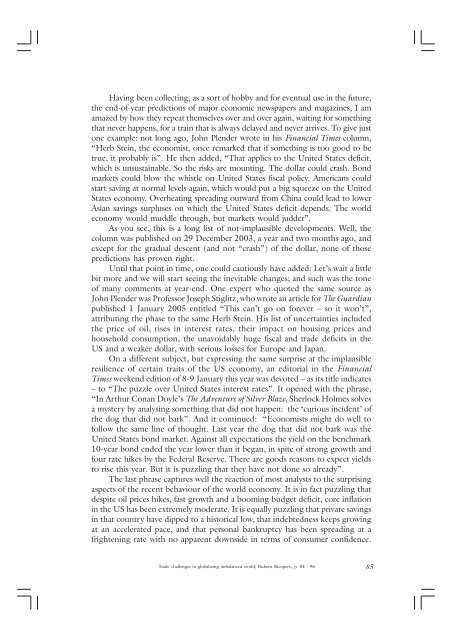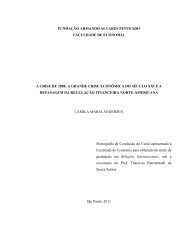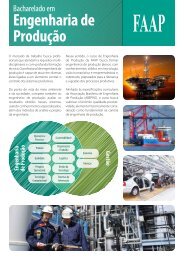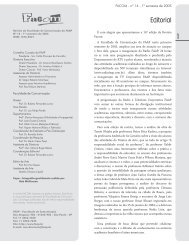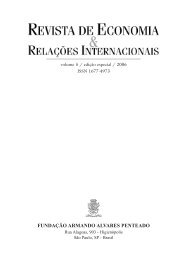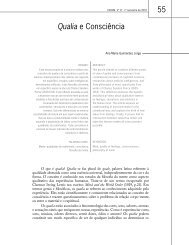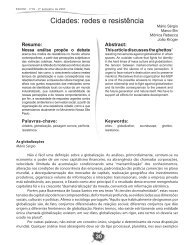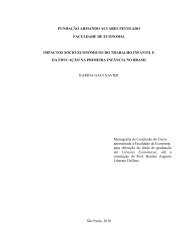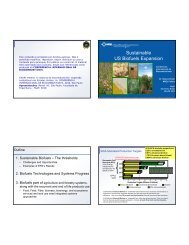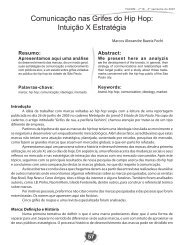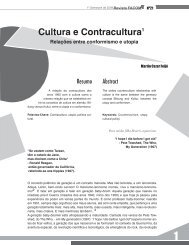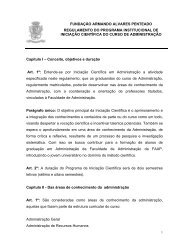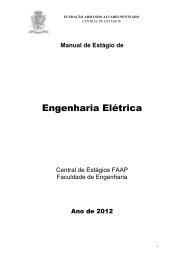Número 8 - Janeiro 2006 - Faap
Número 8 - Janeiro 2006 - Faap
Número 8 - Janeiro 2006 - Faap
Create successful ePaper yourself
Turn your PDF publications into a flip-book with our unique Google optimized e-Paper software.
Having been collecting, as a sort of hobby and for eventual use in the future,<br />
the end-of-year predictions of major economic newspapers and magazines, I am<br />
amazed by how they repeat themselves over and over again, waiting for something<br />
that never happens, for a train that is always delayed and never arrives. To give just<br />
one example: not long ago, John Plender wrote in his Financial Times column,<br />
“Herb Stein, the economist, once remarked that if something is too good to be<br />
true, it probably is”. He then added, “That applies to the United States deficit,<br />
which is unsustainable. So the risks are mounting. The dollar could crash. Bond<br />
markets could blow the whistle on United States fiscal policy. Americans could<br />
start saving at normal levels again, which would put a big squeeze on the United<br />
States economy. Overheating spreading outward from China could lead to lower<br />
Asian savings surpluses on which the United States deficit depends. The world<br />
economy would muddle through, but markets would judder”.<br />
As you see, this is a long list of not-implausible developments. Well, the<br />
column was published on 29 December 2003, a year and two months ago, and<br />
except for the gradual descent (and not “crash”) of the dollar, none of those<br />
predictions has proven right.<br />
Until that point in time, one could cautiously have added: Let’s wait a little<br />
bit more and we will start seeing the inevitable changes; and such was the tone<br />
of many comments at year-end. One expert who quoted the same source as<br />
John Plender was Professor Joseph Stiglitz, who wrote an article for The Guardian<br />
published 1 January 2005 entitled “This can’t go on forever – so it won’t”,<br />
attributing the phase to the same Herb Stein. His list of uncertainties included<br />
the price of oil, rises in interest rates, their impact on housing prices and<br />
household consumption, the unavoidably huge fiscal and trade deficits in the<br />
US and a weaker dollar, with serious losses for Europe and Japan.<br />
On a different subject, but expressing the same surprise at the implausible<br />
resilience of certain traits of the US economy, an editorial in the Financial<br />
Times weekend edition of 8-9 January this year was devoted – as its title indicates<br />
– to “The puzzle over United States interest rates”. It opened with the phrase,<br />
“In Arthur Conan Doyle’s The Adventure of Silver Blaze, Sherlock Holmes solves<br />
a mystery by analysing something that did not happen: the ‘curious incident’ of<br />
the dog that did not bark”. And it continued: “Economists might do well to<br />
follow the same line of thought. Last year the dog that did not bark was the<br />
United States bond market. Against all expectations the yield on the benchmark<br />
10-year bond ended the year lower than it began, in spite of strong growth and<br />
four rate hikes by the Federal Reserve. There are goods reasons to expect yields<br />
to rise this year. But it is puzzling that they have not done so already”.<br />
The last phrase captures well the reaction of most analysts to the surprising<br />
aspects of the recent behaviour of the world economy. It is in fact puzzling that<br />
despite oil prices hikes, fast growth and a booming budget deficit, core inflation<br />
in the US has been extremely moderate. It is equally puzzling that private savings<br />
in that country have dipped to a historical low, that indebtedness keeps growing<br />
at an accelerated pace, and that personal bankruptcy has been spreading at a<br />
frightening rate with no apparent downside in terms of consumer confidence.<br />
Trade challenges in globalizing imbalanced world, Rubens Ricupero, p. 84 - 96<br />
85


